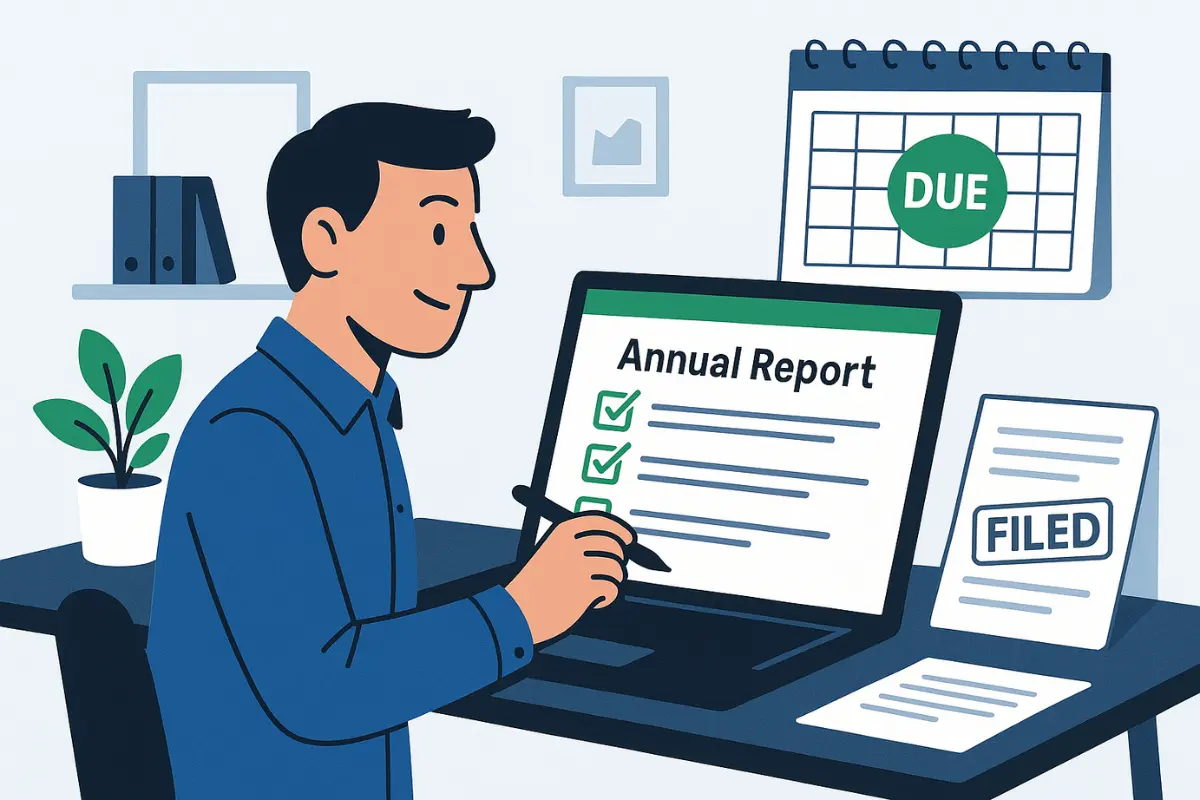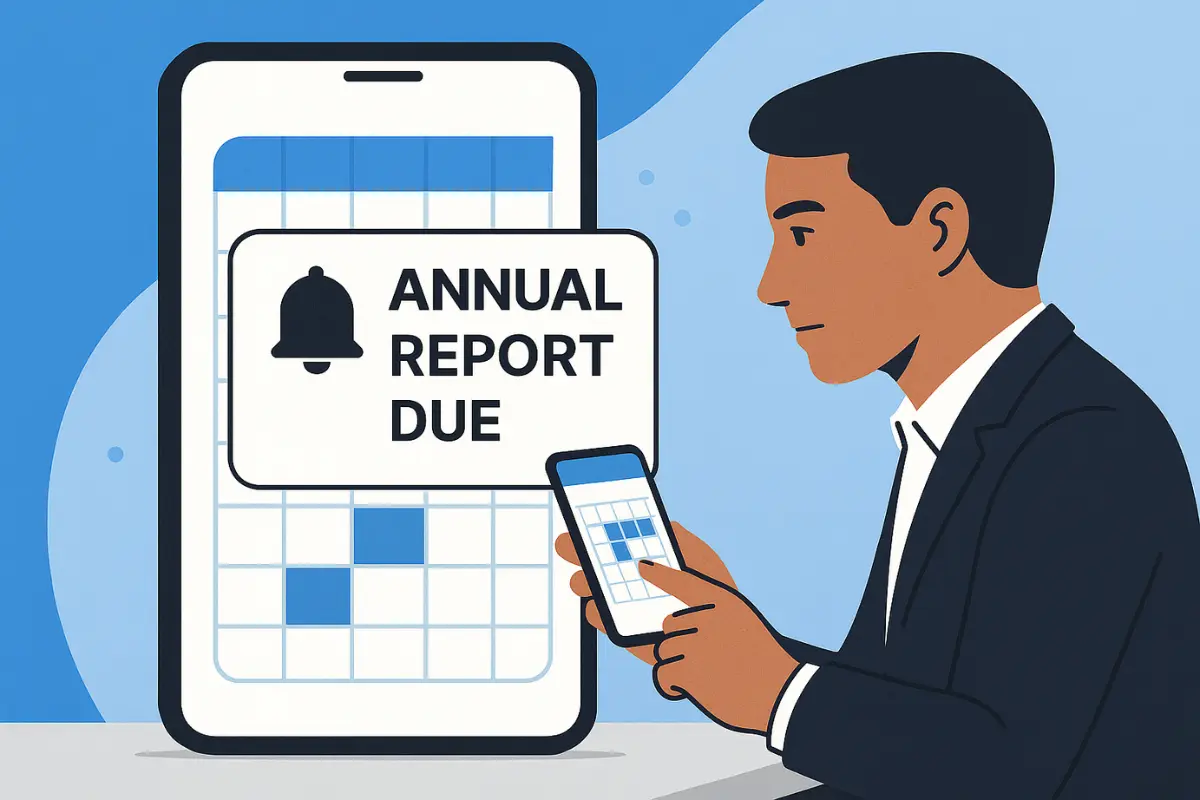How to File an Annual Report Without an Attorney

Even experienced business owners can find themselves facing annual report penalties—not from negligence, but from the genuine complexity of tracking filing requirements, varying deadlines, and constantly changing regulations. A penalty notice or administrative dissolution often arrives as a surprise, not because the business owner wasn't paying attention, but because state systems don't always provide reliable reminders. By then, the damage is done: fines assessed, liability protection compromised, and hours of work ahead to reinstate good standing.
Annual reports may look simple at first glance—just update your business information once a year and move on, right? In practice, even a single state’s filing can involve strict requirements, unforgiving deadlines, and detailed forms where one overlooked change or typo can cause rejection or penalties. Add in the fact that requirements differ from state to state, and the process quickly becomes even more time‑consuming and error‑prone.
Professional compliance filing services offer a practical alternative—they handle the complexity while you focus on what actually grows your business. Here's everything you need to know about annual reports and why outsourcing this task protects both your time and your legal standing.

What Is an Annual Report?
An annual report is a mandatory filing that LLCs, corporations, and other registered business entities must submit to maintain their legal status and good standing with the state. Consider it your company's official yearly update to the government—proof that you're still active and operating under current information.
Filing frequency varies by state. Most require annual submissions, though some operate on biennial cycles (every two years), in which case the document is called a biennial report or biennial statement. A handful of states don't require LLCs to file annual reports at all. The report typically captures essential details like current ownership, management structure, business address, and registered agent information.
Purpose of an Annual Report
States require annual reports primarily to maintain accurate, up-to-date records about businesses operating within their jurisdiction. They need to know where your company is physically located, who's running it, and whether it's still actively conducting business. This information becomes part of the public record, creating transparency around business operations.
Your annual report also functions as formal confirmation that your business remains active and compliant with state regulations. Typical updates include your principal office address, mailing address, registered agent details, and current officers or directors.
Who Needs to File One? (LLCs, Corporations, etc.)
Most formal business structures—including LLCs, corporations, nonprofit corporations, and limited partnerships—face state-mandated annual report requirements to preserve their legal standing. Specific requirements shift based on entity type and state regulations.
General partners in certain partnership structures may also need to submit annual reports, depending on their state's rules. Businesses operating across multiple states must navigate the filing requirements and deadlines for each jurisdiction where they're registered.
Sole proprietorships typically escape annual report obligations since they're not recognized as separate legal entities under state law.
Legal Consequences of Not Filing
Missing your annual report filing triggers consequences that extend far beyond simple late fees. Most states impose escalating penalties over time, with the ultimate consequence being administrative dissolution of your business entity.
When your business faces administrative dissolution, the protective benefits you established through proper entity formation evaporate. Your LLC or corporation no longer shields your personal assets from business debts, you lose the right to operate under your registered entity name, and you'll face serious obstacles obtaining financing, entering contracts, or maintaining business licenses. Late fees generally range from $25 to several hundred dollars, depending on the state and how overdue the filing becomes.
According to SCORE, "If you fail to file your annual report—or file it after the deadline—you could face some unattractive consequences. Make sure you find out what information you need to submit and when you need to submit it to avoid late filing fees, jeopardizing your good standing with your state, or even possible suspension or dissolution of your business."
This is precisely why many business owners choose professional compliance services—the cost of missed deadlines or incorrect filings far exceeds the modest investment in reliable support.
Do You Need a Lawyer to File an Annual Report?
The question isn't really whether you need a lawyer to file an annual report—for most standard situations, you probably don't. The better question is whether managing these filings yourself makes strategic sense for your business.
Filing annual reports involves navigating state-specific requirements, tracking multiple deadlines if you operate in several states, ensuring every detail is accurate, and keeping up with changing regulations. While technically possible to handle independently, most business owners find that outsourcing this administrative burden to a specialized compliance service is not only less stressful but also more cost-effective, helping avoid penalties, delays, and wasted time.

When You Might Need Legal Help
Legal assistance becomes particularly valuable when your business faces complex situations like entity restructuring, ownership disputes, or serious compliance violations. If you've changed your entity type, significantly modified your ownership structure, or fallen severely behind on state filings, an attorney can provide crucial guidance through the complexity of the situation. Routine issues—like filing an annual report to reverse an administrative dissolution—are often resolved with the proper state paperwork and may not require legal counsel.
Still, if you’re ever uncertain about the severity of your situation, it’s always wise to consult an attorney to understand your options and protect your interests.
Why Most Small Businesses Can File Without One
For businesses with straightforward operations and no unusual complications, annual report filing doesn't require attorney involvement. State portals walk you through the process step-by-step, and the required information—business name, addresses, officers, registered agent—should be familiar to any business owner. Filing fees typically range from $10 to $300, making the cost reasonable.
However, "can file without a lawyer" doesn't necessarily mean "should handle it yourself." Many business owners discover that while they can manage their own filings, delegating this task to a professional service eliminates errors, missed deadlines, and the time drain of tracking state requirements—all for a modest fee that's often comparable to what you'd spend anyway in filing fees and your own time.
Step-by-Step Guide: How to File an Annual Report Yourself
Understanding what's involved in filing annual reports helps you appreciate why many business owners choose to outsource this process. Here's what you'd need to manage if you decide to handle filings independently.
Step 1 – Know Your State's Filing Requirements
Each state operates differently when it comes to annual reports. You'll need to research your state's Secretary of State website or the division responsible for business filings to understand your specific filing requirements. Filing methods, required information, and deadlines vary significantly by state and entity type.
Due dates might align with your business formation anniversary month, follow the calendar year, or fall on fixed dates like the third Friday of a specific month. Some states require annual filings while others operate on biennial cycles. Electronic filing is typically the preferred method for faster processing.
If you operate businesses in multiple states, you'll need to track different requirements and deadlines for each jurisdiction—a complexity that makes professional compliance services increasingly attractive.
Step 2 – Gather Required Business Information
Before starting any filing, you'll need to compile all necessary details to ensure accuracy and avoid rejections. Typical information includes your complete legal business name as registered with the state, principal office and mailing addresses, your federal employer identification number (EIN), and current registered agent information including name and address.
Corporations must provide names and addresses of current directors and officers. LLCs need details about members or managers.
Gathering this information sounds simple, but it becomes time-consuming when you're managing multiple entities or haven't kept meticulous records throughout the year.
Step 3 – Access the State's Filing Portal
Navigate to your state's official business filing portal and either log in to your existing account or create a new one. Most states now offer secure online portals for electronic filing, allowing you to submit forms, track filing status, and access your filing history. Look for sections labeled "Annual Reports," "Periodic Reports," or "State Annual Reports" on the state website.
Each state's portal functions differently, which means you'll need to familiarize yourself with the interface and navigation—more time investment that adds up when managing multiple filings.
Step 4 – Complete the Online Form
Work through the online form methodically, verifying pre-populated information and updating any changes. Most forms auto-fill your current registered details, so you'll need to confirm or correct them. When filing online, you won't need to provide physical signatures since electronic submissions are accepted.
Double-check every entry—especially names, addresses, and contact information—for accuracy before proceeding to payment. Even minor errors can result in rejected filings, triggering delays and potential late fees. Additional information may be required depending on your state and entity type.
This is where many DIY filers encounter problems. While you may know your officer details, formatting requirements, outdated records in state systems, or overlooked fields can still cause mistakes that delay approval. Professional compliance services add value by reviewing the information for consistency, handling state-specific nuances, and helping ensure the filing goes through smoothly the first time.
Step 5 – Pay the Filing Fee
Filing fees vary by state and business type. LLC fees typically range from $10 to $300 in most states, while corporations may pay between $25 and $500 or more. However, some states set much higher rates—for example, Massachusetts charges $500 if filed by mail and $520 for online LLC annual reports, making it one of the most expensive states in the country. These higher fees are the exception rather than the rule; most states have much lower annual report costs.
Most states accept payment by credit/debit card or electronic bank transfer (ACH), and some also allow checks or money orders with a payment voucher. Paying online is usually the fastest option and helps avoid late fees, but it’s important to confirm the correct fee for your specific entity type and state before submitting your report.
Step 6 – Confirm and Save Your Submission
After submitting your annual report, download and save your confirmation and receipt for your records. Most states provide immediate confirmation, but processing may take several business days after filing the report. You'll need to verify that your report has been accepted by the state.
This entire process—from research to confirmation—typically consumes several hours per entity, particularly if you're unfamiliar with your state's specific portal and requirements. Multiply that across multiple entities or states, and you're looking at a significant time investment that professional services can eliminate entirely.
Common Mistakes to Avoid
Even straightforward annual report filings can go off track when common errors occur. Understanding these pitfalls helps explain why many business owners choose professional compliance support to minimize costly mistakes.
Missing filing deadlines ranks as the most frequent and expensive error. Late fees start around $25 but can climb to several hundred dollars depending on how overdue the filing becomes. Extended delays risk administrative dissolution—a serious consequence that eliminates your company's liability protection and legal standing. When you're juggling multiple responsibilities as a business owner, it's surprisingly easy for a deadline to slip through the cracks.
Providing incorrect or outdated information creates another common problem. Listing inaccurate details—such as an old business address or outdated officer information—can result in rejected filings and correspondence issues with the state. Business owners who’ve moved or changed officers but fail to update these details in their annual report create inaccurate records, which may lead to penalties, delays, and compliance issues.
As noted by the U.S. Chamber of Commerce, "Incorrect information, like the wrong business address or misstating the names of certain officers, can lead to communication problems with the state. Double-check your annual filing to ensure that all the information is correct."
Another frequent mistake involves forgetting to pay the filing fee or paying the wrong amount, causing processing delays or additional penalties. Some business owners also fail to save confirmation documents, leaving them without proof of filing if questions arise later.
In addition, having a reliable registered agent is essential for staying compliant. While a registered agent won’t directly prevent filing rejections, a dependable service ensures you promptly receive state notices, legal documents, and annual report reminders. Without a reliable registered agent, you risk missing important deadlines or official communications that can jeopardize your company’s good standing and expose you to additional penalties.
Professional registered agent and filing services help reduce these risks by tracking deadlines, maintaining records, and managing the filing process on your behalf. Business owners are still responsible for providing and verifying their company’s information, but working with an expert filing service means critical details are reviewed for consistency and accuracy, state-specific requirements are handled, and filings are submitted on time. This support helps minimize errors, avoid penalties, and ensure your annual report is processed smoothly the first time.
How to Stay Compliant Every Year
Annual report compliance isn't a one-time task—it's an ongoing business responsibility that demands systematic attention. Each state enforces penalties for non-compliance, making reliable requirement and deadline tracking essential for maintaining good standing.
For example, the Washington Secretary of State explains, "Every year, foreign and domestic businesses are required to file an annual report to keep their UBI active and remain in good standing. Failure to file an Annual Report will result in a delinquent business status and eventually administrative dissolution until the report is filed."
The following approaches outline how business owners attempt to manage compliance on their own—and why many eventually transition to professional services for greater reliability and peace of mind.
Use Calendar Alerts and Reminders
Digital calendar alerts and automated reminders help prevent missed deadlines, but they're only effective if you set them up correctly and actually respond when the alerts trigger. Many business owners set recurring annual reminders at least 60 days before filing deadlines, giving themselves time to gather information and complete the process without rushing.
The reality is that calendar reminders only work if they're your only priority when they fire. During busy periods, it's easy to dismiss a reminder with the intention of handling it later—and then forget entirely until it's too late. Some states send courtesy email reminders, but you can't rely on these notifications arriving consistently or reaching your inbox.
InCorp provides built-in tools and app-based reminders to help business owners keep track of important filing deadlines in every state. Our EntityWatch system monitors status and upcoming due dates, while automated alerts prompt clients to take action as deadlines approach. This helps reduce the risk of missed reports, especially for those managing multiple requirements throughout the year.

Consider a Registered Agent Service
Professional registered agent services provide more than just a point of contact for legal documents. Many registered agent providers, including InCorp, offer comprehensive compliance support that includes automatic reminders for annual report filings and assistance with completing the filing process itself.
This approach dramatically reduces the risk of missed deadlines and helps ensure your business maintains good standing with state requirements. For business owners managing multiple entities or operating across several states, hiring a registered agent service simplifies compliance tracking by providing centralized oversight. When all deadlines and notices are routed through a single provider, nothing falls through the cracks, and there's no need to manually monitor correspondence from every jurisdiction
If you're currently serving as your own registered agent, transitioning to a professional service as your can provide privacy protection and ensure reliable availability during business hours. This proves particularly valuable for business owners who want to reduce administrative burdens and avoid the risks associated with missed or mishandled state notifications—without incurring the higher costs of hiring an attorney.
Maintain Updated Company Records
Keeping accurate, current business records throughout the year makes annual report filing quicker and reduces the risk of errors. When changes occur—new officers, address updates, ownership modifications—you should update internal records promptly to ensure filings reflect correct information.
In practice, maintaining organized records requires consistent discipline. You need current copies of articles of incorporation or organization, operating agreements, and any amendments to your business structure, all readily accessible when filing time arrives.
While staying on top of record-keeping helps reduce errors and save time, it requires consistent systems that many business owners find hard to maintain while managing daily operations. With InCorp, clients receive clear guidance about state requirements and automated alerts for filing deadlines, which makes it easier to manage essential records without constant attention.
Final Thoughts: Filing Doesn't Have to Be Complicated
Annual report filing represents one of the most manageable aspects of business compliance when you have the right support in place. While technically possible to handle independently, most business owners discover that the time investment, error risks, and deadline tracking complexity make professional filing services a smarter investment.
The question isn't whether you can file your own annual reports—it's whether spending hours managing state paperwork represents the best use of your time as a business owner. Every hour you spend researching filing requirements, completing forms, and tracking deadlines is an hour you're not spending on revenue-generating activities, strategic planning, or business growth.
Professional services like InCorp eliminate the headaches, protect against costly errors and missed deadlines, and free you to focus on your company. With organized records, automatic deadline tracking, and expert filing assistance, compliance becomes a seamless background process rather than a recurring administrative burden.
FAQs
Can I file my annual report online?
Yes, most states now allow electronic filing through their official Secretary of State portals. Online filing typically processes faster and costs less than paper filing methods. However, navigating different state portals and ensuring accurate completion still requires time and attention to detail.
What is the deadline to file?
Annual report deadlines vary significantly by state and entity type. Some states use your business's formation anniversary month, while others have fixed calendar dates. This variation makes tracking multiple deadlines particularly challenging for multi-state businesses. Professional compliance services automatically track all relevant deadlines, eliminating the risk of missing critical filing dates.
How much does it cost?
State filing fees for annual reports typically range from $10 to $300, depending on your state and your type of business entity. Some states charge lower fees (around $10–$50), while others set much higher amounts, especially for corporations or businesses with complex structures. These government fees are unavoidable, whether you file independently or use a professional filing service. If you use a service provider like InCorp, you'll pay the required state fee as well as a separate service charge for the administrative filing; the two fees are itemized so you can clearly see each cost.
Can I file late?
Yes, you can usually file your annual report after the deadline, but late fees or penalties apply that vary by state. Common late fees start around $25 and increase substantially based on how overdue the filing becomes. Extended delays risk administrative dissolution (loss of good standing or legal status), which creates serious complications for your business.
Do all businesses need to file an annual report?
Most limited liability companies (LLCs), corporations, and limited partnerships face annual report requirements. However, sole proprietorships generally don't have this obligation since they're not considered separate legal entities from their owners. The specific requirements depend on your entity type and state regulations. For businesses with filing obligations, professional compliance services ensure you never miss a required filing regardless of how complex your structure becomes.
How much does it cost to file an annual report in California?
California filing fees vary by business type. LLCs must file a biennial Statement of Information (the annual report equivalent) every two years with a $20 filing fee. Corporations file annual reports yearly with a $25 fee.
These filing fees are separate from other state obligations like the California LLC annual franchise tax of $800, which LLCs must pay regardless of their Statement of Information filing. Check the California Secretary of State website for the latest fees and requirements specific to your business type.
Are there any special requirements for annual reports in Florida?
Yes, Florida enforces particularly time-sensitive requirements. Businesses can begin filing annual reports through the Florida Department of State's official website, Sunbiz.org, starting January 1 each year. The filing deadline is May 1. Missing this deadline triggers a $400 late fee—significantly higher than most states.
If the report remains unfiled by the third Friday in September, the state initiates administrative dissolution procedures. While the filing window opens January 1, late fees begin accumulating after May 1, and the third Friday in September represents the cutoff before dissolution proceedings begin.
These strict deadlines and severe consequences make Florida annual reports particularly risky for DIY filing. Many Florida business owners choose professional compliance services specifically to avoid these expensive penalties.
How much does it cost to file an annual report in Kentucky?
The filing fee for annual reports in Kentucky is $15 for most business types, including corporations, LLCs, limited partnerships, and nonprofits. Reports are due by June 30 each year. Kentucky doesn't charge late fees, but failure to file by the June 30 deadline results in "bad standing" status and a 60-day notice to file by August 31 to avoid administrative dissolution or revocation. Filing can be completed online or by mail.
How much does it cost to file an annual report in North Carolina?
The cost to file an annual report in North Carolina depends on your business type:
-
Business Corporations and Banks: Due on the 15th day of the 4th month after your fiscal year ends. Filing fee: $21 online*, $25 paper.
-
Limited Liability Companies (LLC or L3C): Due April 15 each year after formation. Filing fee: $203 online*, $200 paper.
-
Partnerships (LLP and LLLP): Due on the 15th day of the 4th month after the fiscal year ends. Filing fee: $203 online*, $200 paper.
-
Cooperative Associations (with common stock): Due by March 1 annually. Paper filing only, $10 fee.
North Carolina does not charge late fees for annual reports. However, failure to file results in a 60-day notice of pending administrative dissolution or revocation.
*Online fees include a $3 electronic filing charge for credit cards or $2 for ACH payments.
These varying requirements across different entity types demonstrate the complexity business owners face when managing their own compliance—another reason many choose professional services to handle the details.
Professional Compliance Services for Stress-Free Annual Reports
Protect your business's good standing and eliminate annual report headaches. InCorp's compliance services handle all your annual report filings, deadline tracking, and state requirements so you can focus on growing your business. Contact us today to simplify your compliance obligations and gain peace of mind.
Share This Article:
Stay in the know!
Join our newsletter for special offers.